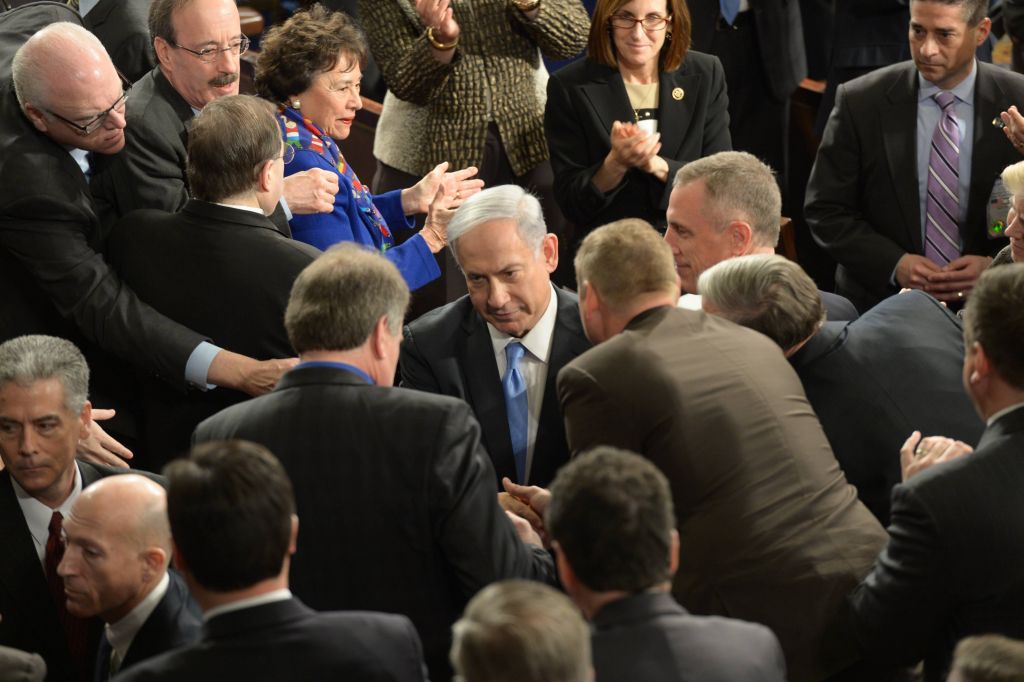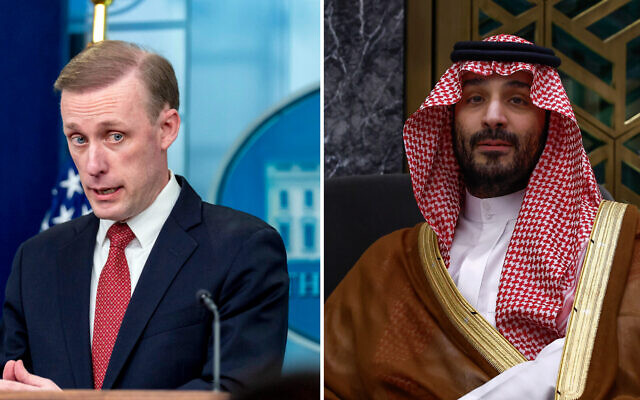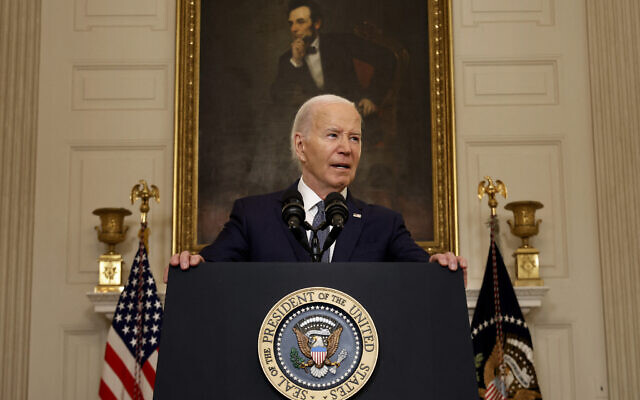



Prime Minister Benjamin Netanyahu will present a new position on Palestinian statehood during his speech in Washington in July that will allow normalization with Saudi Arabia to progress, according to a Tuesday evening report.
Senior aides to the Israeli leader have told the White House that Netanyahu’s address to a joint session of Congress will contain elements that back United States President Joe Biden’s grand vision for the Middle East, Channel 13 news reported.
That plan includes a ceasefire-for-hostages deal to end the fighting in Gaza, a diplomatic solution for the Israel-Hezbollah conflict in Lebanon, a pathway toward a Palestinian state, and diplomatic ties between Riyadh and Jerusalem.
Biden’s Middle East vision takes on additional urgency as presidential elections loom in November. According to a Tuesday New York Times poll, Republican challenger Donald Trump leads Biden in seven key swing states, and would triumph by 312 electoral votes to Biden’s 226 according to the current polling.
Engineering a Saudi-Israel normalization deal would be a diplomatic masterstroke, one that could blunt criticism of Biden’s policies in Gaza and in Ukraine.
The Prime Minister’s Office pushed back on the report in comments to The Times of Israel, saying that Netanyahu “opposes a Palestinian state and will not change his position in his address to Congress.”

At the same time, the PMO response did leave some maneuvering space for Netanyahu to offer rhetorical support for a vague process that leads toward increased Palestinian autonomy short of a state.
Last month, the US and Saudi Arabia discussed a “semi-final” version of wide-ranging security agreements between the countries. The agreements are considered a major part of Washington’s efforts to bring Riyadh around to recognizing Israel for the first time. Saudi Arabia and the US have been clear that movement toward Palestinian statehood is a condition for an agreement.
A bilateral deal between Saudi Arabia and the US that cuts Israel out is seen as unlikely. The US Constitution demands a two-thirds Senate majority for a formal defense pact, one that both parties have reason to reject without the Israel element.
Netanyahu’s July 24 speech is causing consternation among many Democrats, many of whom are torn between their long-standing support for Israel and dismay over the way Israel has conducted military operations in Gaza.
While some Democrats are saying they will attend out of respect for Israel, a larger and growing faction wants no part in it, creating an extraordinarily charged atmosphere at a gathering that normally amounts to a ceremonial, bipartisan show of support for an American ally.

The invitation from House Speaker Mike Johnson, a Louisiana Republican, to Netanyahu came after consultation with the White House, according to a person familiar with the matter who was granted anonymity to discuss the sensitive subject. As of now, no meeting with Biden has been scheduled during Netanyahu’s Washington visit, that person said.
On Wednesday, a group of prominent Israeli figures, including former prime minister Ehud Barak, called on Washington to withdraw the invitation.
In a New York Times opinion piece, they cast the invitation as a “terrible mistake,” warning that the prime minister’s speech “will not represent the State of Israel and its citizens, and it will reward his scandalous and destructive conduct toward our country.”
“Inviting Mr. Netanyahu will reward his contempt for US efforts to establish a peace plan, allow more aid to the beleaguered people of Gaza and do a better job of sparing civilians,” the article read.
The piece was signed by Barak; David Harel, the president of Israel’s Academy of Sciences and Humanities; Tamir Pardo, a former Mossad spy agency director; Talia Sasson, a former prosecutor in the State Attorney’s Office; Aaron Ciechanover, who won the Nobel Prize in Chemistry in 2004; and writer David Grossman.
Tensions between Netanyahu’s office and the Biden administration re-emerged last week, when the prime minister issued a video statement slamming the “inconceivable” “bottlenecks” that the US had placed in transferring shipments of weapons and ammunition and claiming that he had raised the issue during his meeting the previous week with US Secretary of State Antony Blinken, who assured him that Washington would address the issue.

The video shocked the Biden administration, which has insisted that it had no idea what Netanyahu was talking about. There was one shipment of high-payload bombs that was held up last month due to US fears that it would be used in the then-crowded southern Gaza city of Rafah, but all other transfers are continuing at a regular pace, the US has insisted.
Two days later, the White House went further, calling Netanyahu’s video “deeply disappointing” given that “there’s no other country that’s done more or will continue to do more than the United States to help Israel.” Netanyahu retorted that he was prepared to incur such criticism as long as Israel “receives the ammo it needs from the US in an existential war.”
There have also been strains over other issues, including efforts to reach a ceasefire deal on which Biden’s entire regional plan hinges. But US frustration with Hamas has grown in recent weeks, and Washington blamed the terrorist group on Tuesday for rejecting the proposal laid out by Biden and backed by Israel.
An Israeli official, speaking on condition of anonymity to The Times of Israel, suggested that the shift in rhetoric out of Washington is part of an effort to further isolate Hamas and the provide Iran-backed Hezbollah terror group an “off-ramp” to taper off its cross-border attacks on northern Israel that threaten to ignite a full-blown war.
Jacob Magid contributed to this report.
